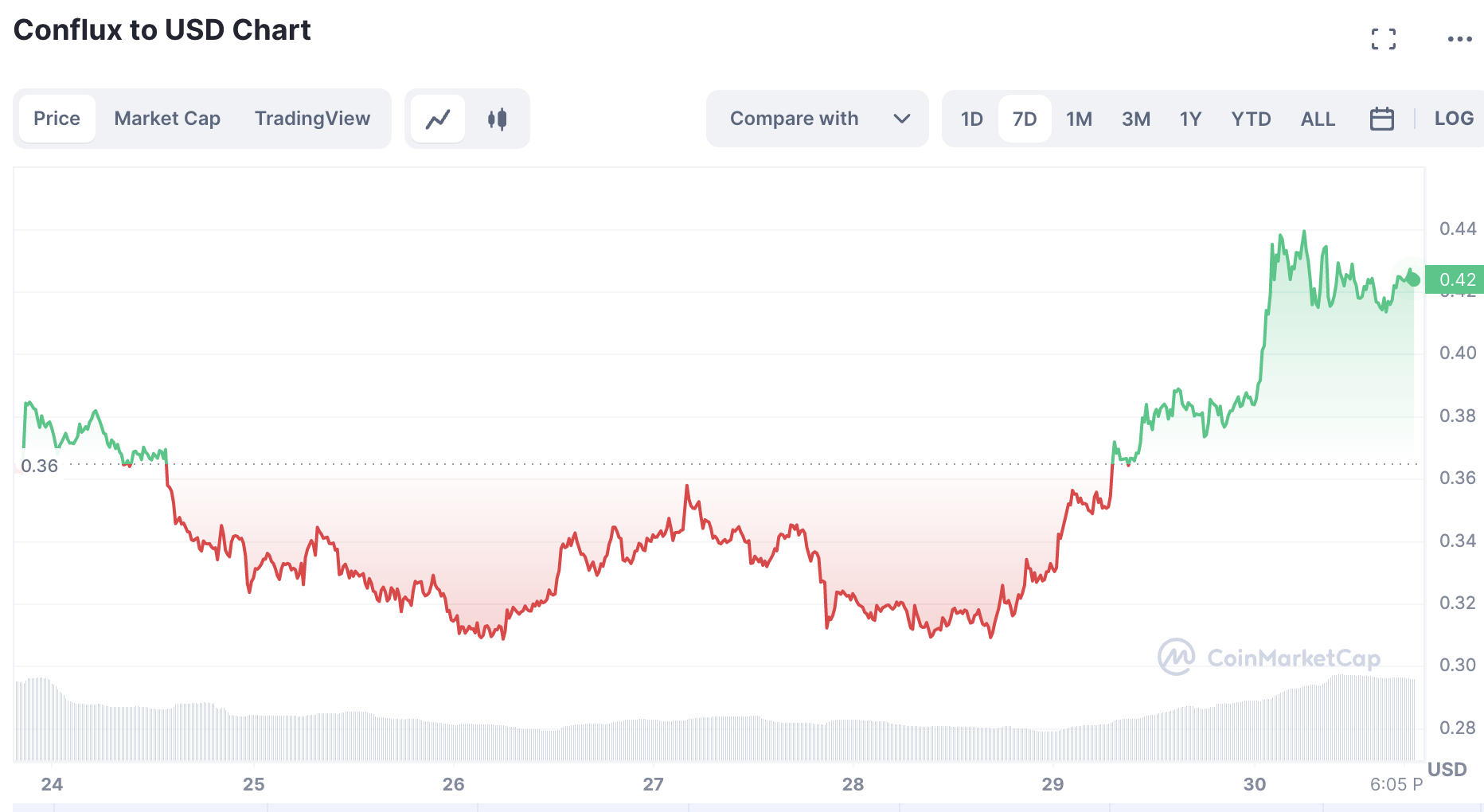Join Our Telegram channel to stay up to date on breaking news coverage
Conflux’s CFX token spiked by over 10% on Thursday, and it has been one of the top performers for the year so far. CFX rose by over 1800% since the start of the year, with significant price increases throughout February and most of March.
Coinflux to Integrate Crypto Wallets In Physical SIMs
Coinflux’s blockchain-enabled sim card (BSIM) has been one of the main reasons for this bullish performance, and the token followed an upward trajectory last month following the announcement of BSIM. The company also has a strong presence in China and plans to offer a unique way for users to interact with their crypto applications on a daily basis.
The partnership between Conflux Network and China Telecom has resulted in the development of the BSIM card, an all-new product by the company. China Telecom is the second-largest wireless carrier in China with an estimated 390 million subscribers.
The BSIM pilot program is set to be launched in Hong Kong later this year, followed by additional pilots in major cities across mainland China such as Shanghai.
The BSIM card is a significant advancement in digital asset management as it stores both the user’s public and private keys within the card and performs digital signatures without exposing the private key, thereby providing enhanced security to users.
Unlike traditional crypto wallets, which rely on software to manage and protect digital assets, the BSIM card is a hardware-based solution that ensures the security of digital assets by keeping the private key within the card itself.
This unique feature is particularly important for users who are concerned about the safety and security of their digital assets, as it significantly reduces the risk of hacking, theft, or other forms of unauthorized access.
The BSIM card offers users the convenience of storing digital assets safely, transferring them conveniently, and displaying them in a variety of applications.
Coinflux’s chief technology officer, Ming Wu, emphasized how the BSIM card offers users greater security, flexibility, and convenience when managing their digital assets in a recent interview. Mr Wu also discussed Conflux’s future plans, which include expanding the availability of the BSIM card to other regions and exploring new use cases for the technology.
Mr Wu also noted that the BSIM card is not suitable for all users and may not be as user-friendly as some traditional crypto wallets. He also cautioned that the BSIM card may not be compatible with all digital asset platforms and applications, which could limit its usefulness for some users.
How Does Coinflux’s BSIM Work?
Crypto wallets have been a hot topic of discussion, and users have been divided between hot wallets and cold wallets. Hardware wallets have been particularly favored for their security since they can’t be accessed with an internet connection and therefore remain protected from hackers.
These wallets can be inconvenient to carry and you’ll have to locate them every time you need to make a transaction. Coinflux’s BSIM eliminates the need for this by integrating a hardware crypto wallet into a SIM card. Such that users can store their private and public keys on the card.
BSIM card will support encrypted storage and key revival and has ten times the storage capacity and computational power of a SIM card.
Equipping a mobile phone with a BSIM card provides users with both the security of a hardware cold wallet and the convenience of portability. This feature allows users to achieve high-level wallet security without disrupting their normal phone usage.
The BSIM card’s unique advantage lies in its ability to offer dual benefits, allowing users to access their wallets from anywhere, while also keeping them secure.
For users who value their privacy, there may be a minor drawback to consider. In certain regions, particularly mainland China, obtaining a BSIM card requires undergoing a “know-your-customer” process. This means that your mobile phone number will be linked to your public key account.
However, this may not be seen as an issue, as it aligns with regulations in China, making the use of these crypto wallets more compliant and thus garnering support from the government. Additionally, it enables the integration of users’ on-chain information with off-chain data from the real world, bridging the gap between the metaverse and reality.
It is worth noting that while some users may view this association of personal information with their wallet as a privacy concern, it also offers benefits in terms of regulatory compliance and practicality.
The ability to unify on-chain and off-chain data creates a more seamless and comprehensive user experience. Moreover, this aligns with China’s push for increased regulation and transparency in the crypto industry. As such, the BSIM card’s mandatory KYC process in certain regions may be seen as a necessary step towards wider adoption and legitimacy of crypto assets in these areas.
Here’s How BSIM Will Transform The Entry to Metaverse
A SIM card is one of the most common pieces of technology used by almost every individual with a mobile phone, and most of these users are unfamiliar with the crypto world. A large number of already present users mean that by integrating wallet features into a SIM card, you’re introducing the product to an entire demographic who just need to upgrade their current SIM to BSIM.
A mobile application is being developed that utilizes a BSIM card to enable users to manage their digital assets without requiring knowledge of crypto keys, facilitating participation in Web3 and the Metaverse.
The BSIM card provides a balance between security and convenience, appealing to both traditional and original crypto users. Prototype chips have been created and tested on the Conflux network, with plans for volume production in collaboration with a China Telecom partner in Hong Kong this year.
The favorable policy environment for the crypto industry in Hong Kong, combined with its proximity to mainland China, makes it an ideal location for the production rollout. With increased support for blockchain technology and Justin Sun’s decision to relocate Huobi’s Asia headquarters from Singapore to Hong Kong, the city serves as a critical bridge connecting the Web3 industry in China to the global market.
Related Articles
Best Wallet - Diversify Your Crypto Portfolio
- Easy to Use, Feature-Driven Crypto Wallet
- Get Early Access to Upcoming Token ICOs
- Multi-Chain, Multi-Wallet, Non-Custodial
- Now On App Store, Google Play
- Stake To Earn Native Token $BEST
- 250,000+ Monthly Active Users
Join Our Telegram channel to stay up to date on breaking news coverage


